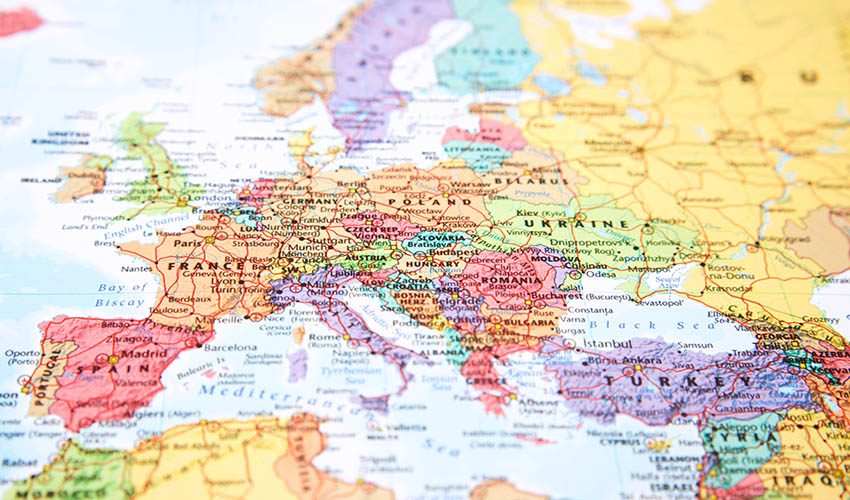SF State experts weigh in on rise of far-right populism in Europe

The upcoming French presidential election serves as a microcosm for what’s happening globally, a rise in right-wing populism.
The May 7 French election is drawing massive attention because it could signal an end to the European Union
Mahmoud Monshipouri, an SF State professor of international relations, said during a University panel on the rise of far-right populism in Europe that National Front candidate Marine Le Pen will have a chance to win the French presidential election May 7. He said he’s seen three trends sweeping across Europe — the rise in anti-economic globalization sentiments, feelings of cultural insecurity and anxiety brought on by massive migrations of immigrants, and the growth of illiberal nationalism (a narrow and xenophobic form of nationalism) — which make him believe she could potentially win.
And that’s worrisome to both Monshipouri and SF State Professor of History Sarah Curtis, because if Le Pen wins, it could mean an eventual end to the European Union. France was an original member of the EU and French-German relations have been the centerpiece of European peace since 1945, Curtis said. A French exit could have a number of drastic consequences, such as the devaluation of the euro and the further spread of right-wing and anti-immigration sentiments, Monshipouri adds.
The finalists in the French election are centrist and founder of the En Marche! (On the Move) party Emmanuel Macron and far-right populist Le Pen, former president of the National Front party. Polls continue to show Macron has a sizeable lead over Le Pen. However, U.S. President Donald Trump, a right-wing populist, won the 2016 election despite what polls predicted. And news reports show voter enthusiasm in France has waned.
Le Pen opposes immigration, supports leaving the European Union and favors protectionist economic policies. Macron is pro-EU and supports free trade and a France engaged with the rest of the world. What’s been novel about the election is the success Le Pen has achieved, Curtis said. According to Curtis, she’s an extremely talented politician, garnering 21.3 percent of the vote in the first-round election. And she’s worked hard to normalize the once-racist and anti-Semitic National Front party originally led by her father. Her critics contend that shift is only superficial, Curtis said.
Even if Le Pen loses she has grown a large political base and now the National Front can’t be ignored, Monshipouri adds. A Macron victory is likely to raise several questions about the EU’s future and its elite-oriented decision-making processes.
Who in Europe supports right-wing populism?
Throughout history, populism has come in on all sides of the political spectrum, but generally it’s a set of ideas belonging to people who feel ignored and concerned that their nation has become contaminated by different elements, according to SF State Assistant Professor of International Relations Scott Siegel. The current brand of right-wing populism that’s popped up in France, the Netherlands, England and Germany is a response to a number of perceived threats: economic globalization, immigration, minorities, established political parties, Islam and multiculturalism, Siegel said.
“The people who tend to vote for right parties have authoritarian values to begin with. They tend to be semi-educated and come from areas where there have been a recent rapid influx of immigrants,” Siegel said. “In Europe, people are trying to figure out how to accommodate new types of diversity.” This has shown up in France as the ban against wearing burkinis and Muslim headscarves in public and prohibiting kosher and halal butchery in Denmark
What’s happening in Europe is that mainstream political parties have moved closer to the center so there is no longer a difference between the two for certain voters, he added. In France, the centrists are trying to hold at least 40 percent of the voting population and the rest is split between the far left and the far right, Siegel said. “The center left has not figured out how to respond to fears of immigration and its impact while not appearing racist,” he said. In turn, the far-right populist groups have been pushing center-right parties further to the right. “This has happened in Denmark and Holland where the center-right party has become more anti-immigrant,” he added.
The real catalyst for populist groups is a charismatic leader who often determines the success of the group, Siegel said. “You don’t need rules, you don’t need elections, you just put all your electoral energies into a person — the hero who is outside the system and gets things done,” Siegel said. In France, it’s Le Pen; in the U.S., it was Donald Trump.
The real problem with populism is that it raises fears, but it doesn’t offer actual solutions, Monshipouri adds. “Populism does a good job stirring up emotions, but how [it handles] problems in the digital and automation age remains unclear. At the end of the day it doesn’t have a practical solution to offer.” Populism is a propaganda tool, he said, but there’s always a gap between rhetoric and reality.